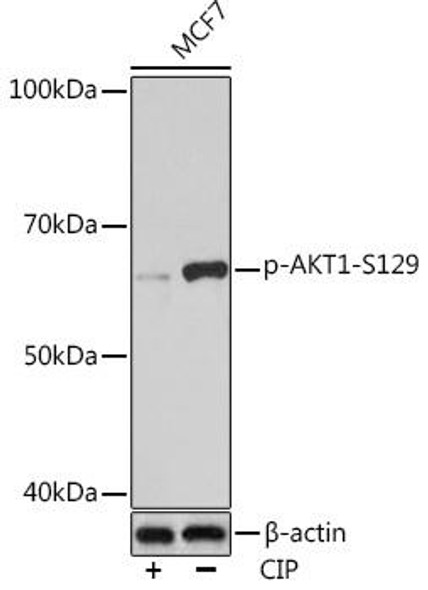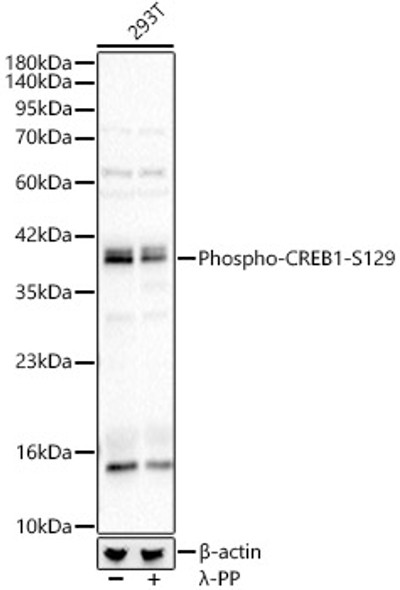Description
| Antibody Name: | Phospho-AKT1-S129 Antibody (CABP1272) |
| Antibody SKU: | CABP1272 |
| Antibody Size: | 50µL, 100µL |
| Application: | Western blotting |
| Reactivity: | Human |
| Host Species: | Rabbit |
| Immunogen: | A synthetic phosphorylated peptide around S129 of human AKT1 (NP_005154.2). |
| Application: | Western blotting |
| Recommended Dilution: | WB 1:500 - 1:2000 |
| Reactivity: | Human |
| Positive Samples: | 293T |
| Immunogen: | A synthetic phosphorylated peptide around S129 of human AKT1 (NP_005154.2). |
| Purification Method: | Affinity purification |
| Storage Buffer: | Store at -20°C. Avoid freeze / thaw cycles. Buffer: PBS with 0.02% sodium azide, 0.05% BSA, 50% glycerol, pH7.3. |
| Isotype: | IgG |
| Sequence: | DNSG A |
| Cellular Location: | Cell membrane, Cytoplasm, Nucleus |
| Calculated MW: | 60kDa |
| Observed MW: | 60KDa |
| Synonyms: | AKT, CWS6, PKB, PKB-ALPHA, PRKBA, RAC, RAC-ALPHA |
| Background: | The serine-threonine protein kinase encoded by the AKT1 gene is catalytically inactive in serum-starved primary and immortalized fibroblasts. AKT1 and the related AKT2 are activated by platelet-derived growth factor. The activation is rapid and specific, and it is abrogated by mutations in the pleckstrin homology domain of AKT1. It was shown that the activation occurs through phosphatidylinositol 3-kinase. In the developing nervous system AKT is a critical mediator of growth factor-induced neuronal survival. Survival factors can suppress apoptosis in a transcription-independent manner by activating the serine/threonine kinase AKT1, which then phosphorylates and inactivates components of the apoptotic machinery. Mutations in this gene have been associated with the Proteus syndrome. Multiple alternatively spliced transcript variants have been found for this gene. provided by RefSeq, Jul 2011 |
 | Western blot analysis of extracts of 293T cells, using Phospho-AKT1-S129 antibody at 1:500 dilution. 293T cells were treated by CIP(20uL/400ul) at 37℃ for 1 hour. Secondary antibody: HRP Goat Anti-Rabbit IgG (H+L) at 1:10000 dilution. Lysates/proteins: 25ug per lane. Blocking buffer: 3% nonfat dry milk in TBST. Detection: ECL Enhanced Kit. Exposure time: 180s. |






